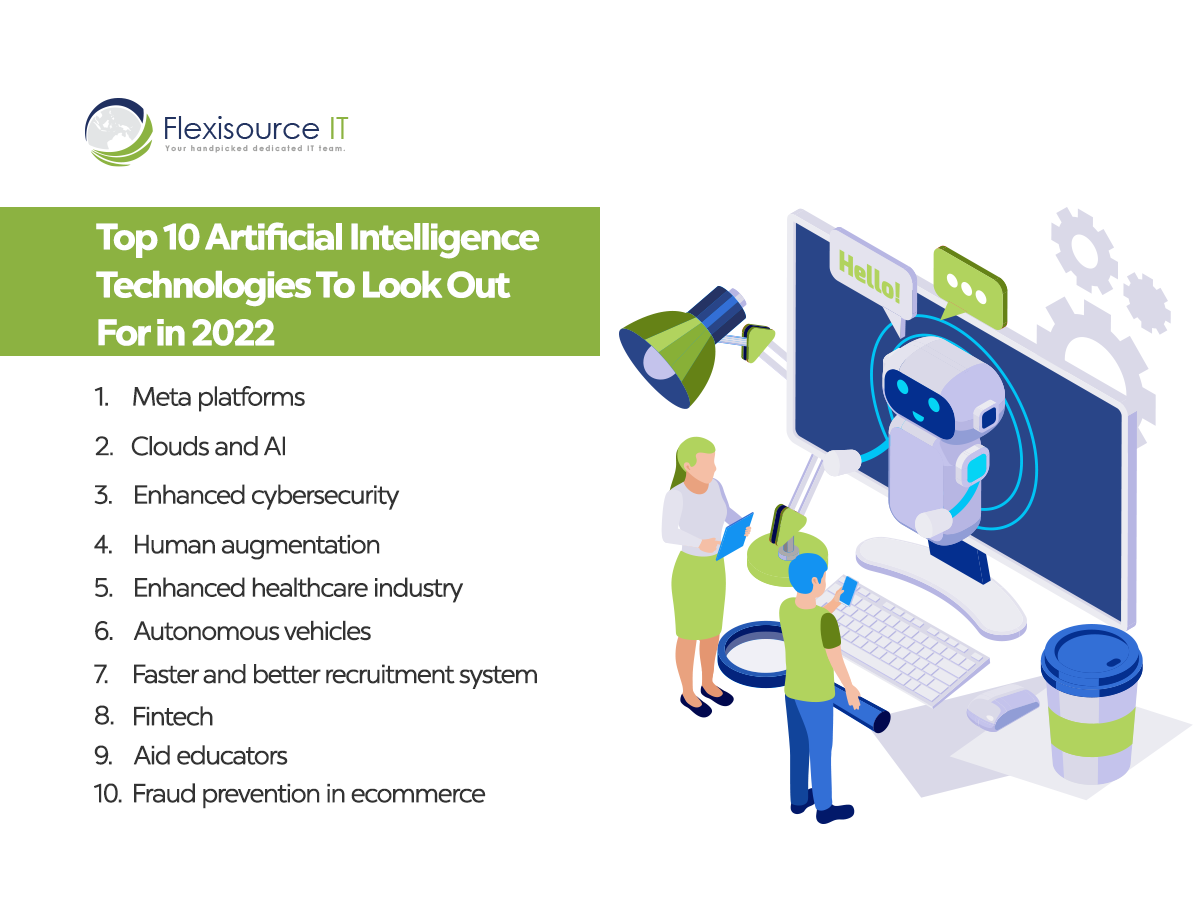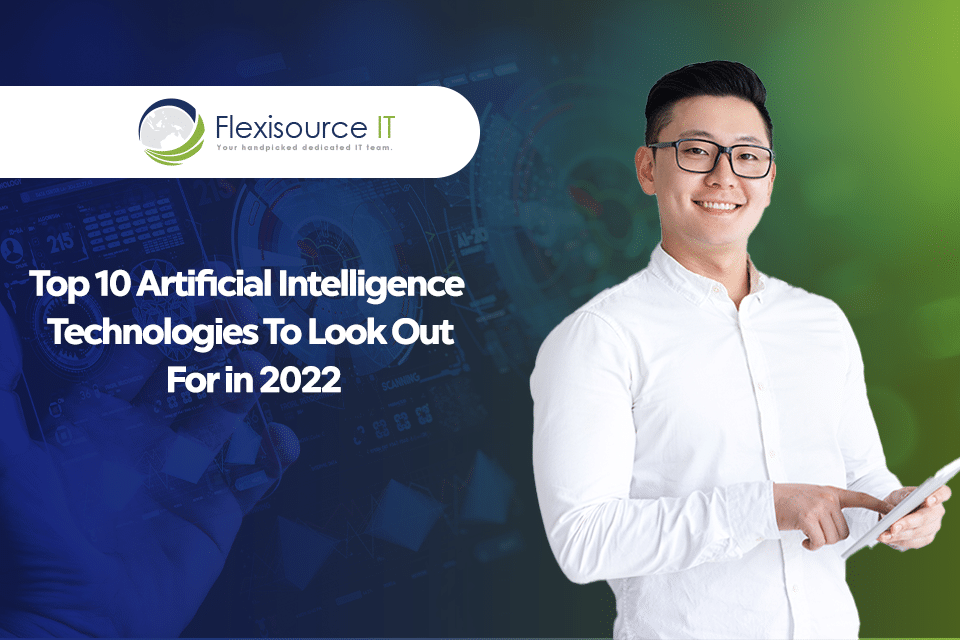Artificial intelligence (AI) and data science are widely used in businesses and our daily lives. From simple errands to bank security, AI’s presence has slowly increased with more innovation and technology coming our way. In fact, in the recent survey by NewVantage in 2022, they found out that nine out of ten businesses are going to invest in AI.
While this could be an ambitious claim, these world developments are expected to rise soon. In fact, most AI technologies are already in use in important events such as rocket launching or discovering cancer treatment.
Thus, this article will highlight 10 Artificial Intelligence Technologies you should look out for in the coming years! Take note that some of these are already in use and being improved in the following years.
What is Artificial Intelligence?
AI refers to a broad set of tools, technologies, and methods used to solve problems in many fields. The field of AI research has been around since the 1950s. Still, it wasn’t until recently that computer scientists were able to develop algorithms and other technologies. And with enough processing power and data storage capacity to solve complex problems.
There are various types of artificial intelligence, such as:
- Machine Learning (ML)
- Deep Learning (DL)
- Natural Language Processing (NLP)
- General Intelligence (AGI)
- Super Intelligence (ASI)
Benefits of Artificial Intelligence In Our Lives?
There are many benefits of AI in our lives. It can make our lives easier, more convenient, and more enjoyable. AI can do things that would take us a long time, like making calculations or finding information. It also does something we cannot do ourselves, like driving a car or understanding speech.
Some people think that AI has the potential to replace humans in the future. Likewise, here are some expected benefits of using AI in our daily lives:
- Perform repetitive and time-consuming tasks faster and quicker.
- Execute complex tasks without high costs
- Analyze large quantities of data that are otherwise harder to perceive
- Operate needs 24×7 such as banking, assistance, GPS, etc.
Top 10 Artificial Intelligence Technologies To Look Out For in 2022

As mentioned earlier, AI is finding its way to integrate with our daily lives quicker than ever. It is not just exclusive to businesses to use anymore. As more and more B2C enterprises adapt to this technology, more and more users are being exposed to AI.
AI is expected to transform businesses like never before, creating new opportunities, leaders, and game experiences. Here are ten examples of artificial intelligence you should look out for in 2022:
1. Meta Platform and the Metaverse
We all know what Facebook is. At this point, we probably have used Facebook to update people, communicate with our loved ones, or promote our business. This platform has been handy to us as it allows users to do everything from creating content to managing their networks and followers or publishing content.
But in 2021, the father company has renamed its enterprise to Meta, reflecting the company’s growth goal of becoming something that is just beyond social media. Meta is now looking to integrate and apply AI technology to its platform, newsfeed, and advertising algorithms. In addition, they are aiming to create the Metaverse, an interesting AI application and digital world in which users interact in virtual reality or environment.
2. Cloud computing
AI has been around for decades, but it didn’t see widespread adoption until 2010 when Arthur Samuel introduced machine learning (ML). After that, AI has been used in cloud computing to help with natural language processing (NLP) and speech recognition, among other things.
Many leading tech companies have recently been providing Artificial intelligence technologies through their popular cloud platform to their users. They incorporated AI technologies to automate complex and repetitive tasks, such as contact sorting, regular backups, and data analysis, without requiring in-house developers or human intervention.
3. Enhanced cybersecurity
With the rise of technology comes the growth of more cyber-attacks. Today, scammers and hackers use advanced technology, AI algorithms, and intelligent techs to conduct their evil deeds. As such, it’s essential to fight these cyber-attacks with AI itself. Tons of intelligent technology have been using prediction algorithms and smart decisions to detect and block attempted intrusions into our technology, protecting our data and lives.
By integrating artificial intelligence technologies, companies can automatically detect cyberattacks like unknown workstations, server errors, code repositories, and others connected to their network. These cyberattacks are something that sometimes a human eye may not detect.
4. Human augmentation
Human augmentation is using technology to extend human abilities and capacities. The idea of human augmentation is not new. Still, it’s becoming more popular with the advent of technologies such as artificial intelligence, robotics, nanotechnology, and biotechnology.
5. Enhanced healthcare industry
Artificial intelligence technologies have been a game-changer to business – particularly healthcare. It not only helped develop robot-assisted surgeries but also has helped doctors diagnose diseases and provide personalized care. It has also helped in the prevention and management of diseases.
AI assistants have been used to help doctors with their work. They can help them find relevant medical information, identify symptoms, and provide treatment options. In addition, people can also use them to monitor patients remotely through wearable devices or sensors that measure vital signs such as blood pressure and heart rate.
In addition, by using AI in cybersecurity, the health care system could share its data across other hospitals while safeguarding private records against criminals.
6. Autonomous vehicles
Likewise, artificial intelligence technologies have revolutionized transportation and passage in the world. In the past, AI helped transport modes become safer, cleaner, and more reliable. It helped improve the railway network, reduce traffic congestion, and identify accident-prone areas, creating seamless connections and faster journeys.
Recently, AI has found its most important use in the automotive industry. The autonomous vehicle is a car that drives itself without any human involvement. It is an advanced technology that promises to make driving safer, more efficient, and more enjoyable.
Most self-driving cars are being developed with the help of AI technology, which has been proven to be very effective for this purpose. People can use AI technology in many different ways, such as navigation, obstacle detection, lane detection, and other functions required for a self-driving car to function properly.
In addition, the driver can also use the AI system to control aspects of the vehicle, such as speed or steering, while driving on highways or roads with clear markings. It has also helped develop some of the vehicle’s components, such as GPS, control signals, radar, cloud service, and more!
7. Faster and better recruitment system
For generations, recruitment probably has been one of the most prolonged processes in HR. There are multiple aspects that they need to conduct, such as finding the perfect candidate, interviewing, background checking, and more.
But with artificial intelligence technologies, recruitment can be conducted in a day! AI has been used in recruitment to enhance candidate screening and shortlisting. It helps recruiters to screen resumes and shortlist candidates for a job opening.
Human resources and recruiters can also use the AI-assisted system for the initial evaluation of a resume by scanning it for keywords that match the job description. Once it identifies the relevant keywords, it can rank the resume accordingly. The AI system will also provide feedback on how well-suited this candidate is for the job opening.
Likewise, AI has helped automate recruitment by eliminating human bias and reducing human error.
8. Fintech
AI is playing a significant role in the financial industry. It has been used to predict stock market trends, forecast customer behavior, and reduce fraud. Moreover, AI has helped in fintech by predicting stock market trends and forecasting customer behavior.
9. Aid educators
The use of AI in the education system is on the rise. In classrooms, AI provides students with personalized content and more accurate feedback. It can also help teachers grade student work, assess student progress, and predict future academic success.
Recently, the education sector has slowly been integrating artificial intelligence technologies in their education methods through aid educators. An aid educator AI is a computer program that provides educational content to learners.
AEducators can use AIto to create interactive lessons with virtual reality simulations, so students can learn without having to leave their desks. So far, the use of AI increased engagement levels in the classroom. The content can be interactive, such as an online game or a virtual reality experience, or static, such as a video.
There are many benefits of using an aid educator AI for education. It can provide interactive and personalized learning experiences to students in remote areas. It also eliminates the need for teachers in classrooms or the need for textbooks and other materials that are expensive to produce and distribute.
10. Fraud prevention in eCommerce
Artificial intelligence technologies are a powerful tool that can prevent fraud in eCommerce. It is one of the most critical applications of AI in the financial sector. There are many ways AI can help with fraud prevention, including:
- Monitoring customer behavior and flagging suspicious transactions
- Predicting customer behavior based on past data
- Detecting fraudulent transactions based on anomalies in purchase patterns.
Want to build your own AI Technologies?
If you are impressed with the AI mentioned above technologies and want to build one of your own, contact Flexisource IT today! We can help you create your own AI with machine learning capabilities and more.





